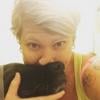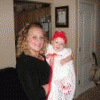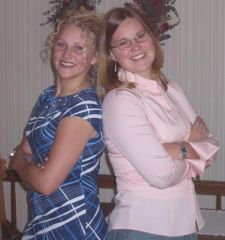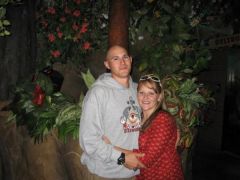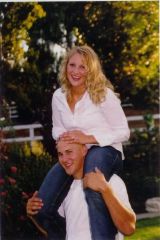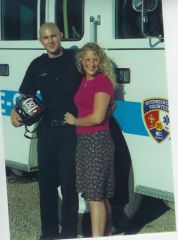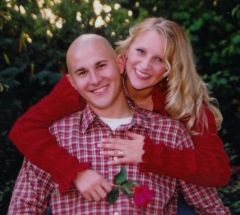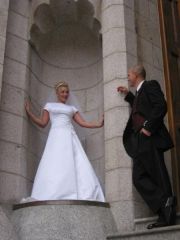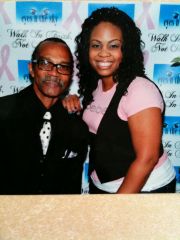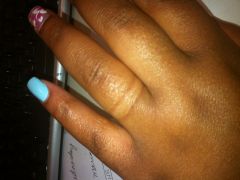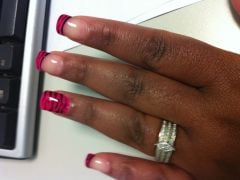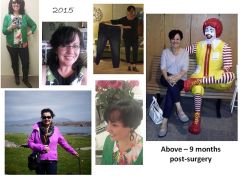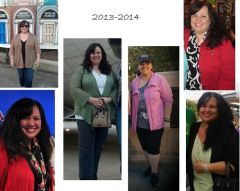I ran accross this today. I found it good information for those of us considering/waiting for WlS.
Pouch Rules for Dummies
INTRODUCTION:
A common misunderstanding of gastric bypass surgery is that the pouch causes weight loss because it is so small, the patient eats less. Although that is true for the first six months, that is not how it works. Some doctors have assumed that poor weight loss in some patients is because they aren’t really trying to lose weight. The truth is it may be because they haven’t learned how to get the satisfied feeling of being full to last long enough.
HYPOTHESIS OF POUCH FUNCTION:
We have four educated guesses as to how the pouch works:
1. Weight loss occurs by actually slightly stretching the pouch with food at each meal or;
2. Weight loss occurs by keeping the pouch tiny through never ever overstuffing or;
3. Weight loss occurs until the pouch gets worn out and regular eating begins or;
4 Weight loss occurs with education on the use of the pouch.
PUBLISHED DATA:
How does the pouch make you feel full?
The nerves tell the brain the pouch is distended and that cuts off hunger with a feeling of fullness.
What is the fate of the pouch? Does it enlarge? If it does, is it because the operation was bad, or the patient is overstuffing themselves, or does the pouch actually re-grow in a healing attempt to get back to normal?
For ten years, I had patients eat until full with cottage cheese every three months, and report the amount of cottage cheese they were able to eat before feeling full. This gave me an idea of the size of their pouch at three month intervals. I found there was a regular growth in the amount of intake of every single pouch. The average date the pouch stopped growing was two years. After the second year, all pouches stopped growing. Most pouches ended at 6 oz., with some as large at 9-10 ozs.
We then compared the weight loss of people with the known pouch size of each person, to see if the pouch size made a difference. In comparing the large pouches to the small pouches, THERE WAS NO DIFFERENCE IN PERCENTAGE OF WEIGHT LOSS AMONG THE PATIENTS. This important fact essentially shows that it is NOT the size of the pouch but how it is used that makes weight loss maintenance possible.
OBSERVATIONAL BASED MEDICINE:
The information here is taken from surgeon’s “observations” as opposed to “blind” or “double blind” studies, but it IS based on 33 years of physician observation.
Due to lack of insurance coverage for WLS, what originally seemed like a serious lack of patients to observe, turned into an advantage as I was able to follow my patients closely. The following are what I found to effect how the pouch works:
1. Getting a sense of fullness is the basis of successful WLS.
2. Success requires that a small pouch is created with a small outlet.
3. Regular meals larger than 1 ½ cups will result in eventual weight gain.
4. Using the thick, hard to stretch part of the stomach in making the pouch is important.
5. By lightly stretching the pouch with each meal, the pouch send signals to the brain that you need no more food.
6. Maintaining that feeling of fullness requires keeping the pouch stretched for awhile.
7. Almost all patients always feel full 24/7 for the first months, then that feeling disappears.
8. Incredible hunger will develop if there is no food or drink for eight hours.
9. After 1 year, heavier food makes the feeling of fullness last longer.
10. By drinking water as much as possible as fast as possible (“water loading”), the patient will get a feeling of fullness that lasts 15-25 minutes.
11. By eating “soft foods” patients will get hungry too soon and be hungry before their next meal, which can cause snacking, thus poor weight loss or weight gain.
12. The patients that follow “the rules of the pouch” lose their extra weight and keep it off.
13. The patients that lose too much weight can maintain their weight by doing the reverse of the “rules of the pouch.”
HOW DO WE INTERPRET THESE OBSERVATIONS?
POUCH SIZE:
By following the “rules of the pouch”, it doesn’t matter what size the pouch ends up. The feeling of fullness with 1 ½ cups of food can be achieved.
OUTLET SIZE:
Regardless of the outlet size, liquidy foods empty faster than solid foods. High calorie liquids will create weight gain.
EARLY PROFOUND SATIETY:
Before six months, patients much sip water constantly to get in enough water each day, which causes them to always feel full.
After six months, about 2/3 of the pouch has grown larger due to the natural healing process. At this time, the patient can drink 1 cup of water at a time.
OPTIMUM MATURE POUCH:
The pouch works best when the outlet is not too small or too large and the pouch itself holds about 1 ½ cups at a time.
IDEAL MEAL PROCESS (rules of the pouch):
1. The patient must time meals five hours apart or the patient will get too hungry in between.
2. The patient needs to eat finely cut meat and raw or slightly cooked veggies with each meal.
3. The patient must eat the entire meal in 5-15 minutes. A 30-45 minute meal will cause failure.
4. No liquids for 1 ½ hours to 2 hours after each meal.
5. After 1 ½ to 2 hours, begin sipping water and over the next three hours slowly increase water intake.
6. 3 hours after last meal, begin drinking LOTS of water/fluids.
7. 15 minutes before the next meal, drink as much as possible as fast as possible. This is called “water loading.” IF YOU HAVEN’T BEEN DRINKING OVER THE LAST FEW HOURS, THIS ‘WATER LOADING’ WILL NOT WORK.
8. You can water load at any time 2-3 hours before your next meal if you get hungry, which will cause a strong feeling of fullness.
THE MANAGEMENT OF PATIENT TEACHING AND TRAINING:
You must provide information to the patient pre-operatively regarding the fact that the pouch is only a tool: a tool is something that is used to perform a task but is useless if left on a shelf unused. Practice working with a tool makes the tool more effective.
NECESSITY FOR LONG TERM FOLLOW-UP:
Trying to practice the “rules of the pouch” before six to 12 months is a waste. Learning how to delay hunger if the patient is never hungry just doesn’t work. The real work of learning the “rules of the pouch” begins after healing has caused hunger to return.
PREVENTION OF VOMITING:
Vomiting should be prevented as much as possible. Right after surgery, the patient should sip out of 1 oz cups and only 1/3 of that cup at a time until the patient learns the size of his/her pouch to avoid being sick.
It is extremely difficult to learn to deal with a small pouch. For the first 6 months, the patient’s mouth will literally be bigger than his/her stomach, which does not exist in any living animal on earth.
In the first six weeks the patient should slowly transfer from a liquid diet to a blenderized or soft food diet only, to reduce the chance of vomiting.
Vomiting will occur only after eating of solid foods begins. Rice, pasta, granola, etc. will swell in time and overload the pouch, which will cause vomiting. If the patient is having trouble with vomiting, he/she needs to get 1 oz cups and literally eat 1 oz of food at a time and wait a few minutes before eating another 1 oz of food. Stop when “comfortably satisfied,” until the patient learns the size of his/her pouch.
SIX WEEKS
After six weeks, the patient can move from soft foods to heavy solids. At this time, they should use three or more different types of foods at each sitting. Each bite should be no larger than the size of a pinkie fingernail bed. The patient should choose a different food with each bite to prevent the same solids from lumping together. No liquids 15 minutes before or 1 ½ hours after meals.
REASSURANCE OF ADEQUATE NUTRITION
By taking vitamins everyday, the patient has no reason to worry about getting enough nutrition. Focus should be on proteins and vegetables at each meal.
MEAL SKIPPING
Regardless of lack of hunger, patient should eat three meals a day. In the beginning, one half or more of each meal should be protein, until the patient can eat at least two oz of protein at each meal.
ARTIFICIAL SWEETENERS
In our study, we noticed some patients had intense hunger cravings which stopped when they eliminated artificial sweeteners from their diets.
AVOIDING ABSOLUTES
Rules are made to be broken. No biggie if the patient drinks with one meal – as long as the patient knows he/she is breaking a rule and will get hungry early. Also if the patient pigs out at a party – that’s OK because before surgery, the patient would have pigged on 3000 to 5000 calories and with the pouch, the patient can only pig on 600-1000 calories max. The patient needs to just get back to the rules and not beat him/herself up.
THREE MONTHS
At three months, the patient needs to become aware of the calories per gram of different foods to be aware of “the cost” of each gram. (cheddar cheese is 16 cal/gram; peanut butter is 24 cals/gram). As soon as hunger returns between three to six months, begin water loading procedures.
THREE PRINCIPLES FOR GAINING AND MAINTAINING SATIETY
1. Fill pouch full quickly at each meal.
2. Stay full by slowing the emptying of the pouch. (Eat solids. No liquids 15 minutes before and none until 1 ½ hours after the meal). A scientific test showed that a meal of egg/toast/milk had almost all emptied out of the pouch after 45 minutes. Without milk, just egg and toast, more than ½ of the meal still remained in the pouch after 1 ½ hours.
3. Protein, protein, protein. Three meals a day. No high calorie liquids.
FLUID LOADING
Fluid loading is drinking water/liquids as quickly as possible to fill the pouch which provides the feeling of fullness for about 15 to 25 minutes. The patient needs to gulp about 80% of his/her maximum amount of liquid in 15 to 30 SECONDS. Then just take swallows until fullness is reached. The patient will quickly learn his/her maximum tolerance, which is usually between 8-12 oz.
Fluid loading works because the roux limb of the intestine swells up, contracting and backing up any future food to come into the pouch. The pouch is very sensitive to this and the feeling of fullness will last much longer than the reality of how long the pouch was actually full. Fluid load before each meal to prevent thirst after the meal as well as to create that feeling of fullness whenever suddenly hungry before meal time.
POST PRANDIAL THIRST
It is important that the patient be filled with water before his/her next meal as the meal will come with salt and will cause thirst afterwards. Being too thirsty, just like being too hungry will make a patient nauseous. While the pouch is still real small, it won’t make sense to the patient to do this because salt intake will be low, but it is a good habit to get into because it will make all the difference once the pouch begins to regrow.
URGENCY
The first six months is the fastest, easiest time to lose weight. By the end of the six months, 2/3 of the regrowth of the pouch will have been done. That means that each present day, after surgery you will be satisfied with less calories than you will the very next day. Another way to put it is that every day that you are healing, you will be able to eat more. So exercise as much as you can during that first six months as you will never be able to lose weight as fast as you can during this time.
SIX MONTHS
Around this time, our patients begin to get hungry between meals. THEY NEED TO BATTLE THE EXTRA SALT INTAKE WITH DRINKING LOTS OF FLUIDS IN THE TWO TO THREE HOURS BEFORE THEIR NEXT MEAL. Their pouch needs to be well watered before they do the last gulping of water as fast as possible to fill the pouch 15 minutes before they eat.
INTAKE INFORMATION SHEET AS A TEACHING TOOL
I have found that having the patients fill out a quiz every time they visit reminds them of the rules of the pouch and helps to get them “back on track.” Most patients have no problems with the rules, some patients really struggle to follow them and need a lot of support to “get it”, and a small percentage never quite understand these rules, even though they are quite intelligent people.
HONEYMOON SYNDROME
The lack of hunger and quick weight loss patients have in the first six months sometimes leads them to think they don’t need to exercise as much and can eat treats and extra calories as they still lose weight anyway. We call this the “honeymoon syndrome” and they need to be counseled that this is the only time they will lose this much weight this fast and this easy and not to waste it by losing less than they actually could. If the patient’s weight loss slows in the first six months, remind them of the rules of water intake and encourage them to increase their exercise and drink more water. You can compare their weight loss to a graph showing the average drop of weight if it will help them to get back on track.
EXERCISE
In addition to exercise helping to increase the weight loss, it is important for the patient to understand that exercise is a natural antidepressant and will help them from falling into a depression cycle. In addition, exercise jacks up their metabolic rate during a time when their metabolism after the shock of surgery tends to want to slow down.
THE IDEAL MEAL FOR WEIGHT LOSS
The ideal meal is one that is made up of the following: ½ of your meal to be low fat protein, ¼ of your meal low starch vegetables and ¼ of your meal solid fruits. This type of meal will stay in your pouch a long time and is good for your health.
VOLUME VS. CALORIES
The gastric bypass patient needs to be aware of the length of time it takes to digest different foods and to focus on those that take up the most space and take time to digest so as to stay in the pouch the longest, don’t worry about calories. This is the easiest way to “count your calories.” For example, a regular stomach person could gag down two whole sticks of butter at one sitting and be starved all day long, although they more than have enough calories for the day. But you take the same amount of calories in vegetables, and that same person simply would not be able to eat that much food at three sittings – it would stuff them way too much.
ISSUES FOR LONG TERM WEIGHT MAINTENANCE
Although everything stated in this report deals with the first year after surgery, it should be a lifestyle that will benefit the gastric bypass patient for years to come, and help keep the extra weight off.
COUNTER-INTUITIVENESS OF FLUID MANAGEMENT
I admit that avoiding fluids at meal time and then pushing hard to drink fluids between meals is against everything normal in nature and not a natural thing to be doing. Regardless of that fact, it is the best way to stay full the longest between meals and not accidentally create a “soup” in the stomach that is easily digested.
SUPPORT GROUPS
It is natural for quite a few people to use the rules of the pouch and then to tire of it and stop going by the rules. Others “get it” and adhere to the rules as a way of life to avoid ever regaining extra weight. Having a support group makes all the difference to help those that go astray to be reminded of the importance of the rules of the pouch and to get back on track and keep that extra weight off. Support groups create a “peer pressure” to stick to the rules that the staff at the physician’s office simply can’t create.
TEETER TOTTER EFFECT
Think of a teeter totter suspended in mid air in front of you. Now on the left end is exercise that you do and the right end is the foods that you eat. The more exercise you do on the left, the less you need to worry about the amount of foods you eat on the right. In exact reverse, the more you worry about the foods you eat and keep it healthy on the right, the less exercise you need on the left.
Now if you don’t concern yourself with either side, the higher the teeter totter goes, which is your weight. The more you focus on one side or the other, or even both sides of the teeter totter, the lower it goes, and the less you weigh.
TOO MUCH WEIGHT LOSS
I have found that about 15% of the patients which exercise well and had between 100 to 150 lbs to lose, begin to lose way too much weight. I encourage them to keep up the exercise (which is great for their health) and to essentially “break the rules” of the pouch. Drink with meals so they can eat snacks between without feeling full and increase their fat content as well take a longer time to eat at meals, thus taking in more calories.
A small but significant amount of gastric bypass patients actually go underweight because they have experienced (as all of our patients have experienced) the ravenous hunger after being on a diet with an out of control appetite once the diet is broken. They are afraid of eating again. They don’t “get” that this situation is literally, physically different and that they can control their appetite this time by using the rules of the pouch to eliminate hunger.
BARIATRIC MEDICINE
A much more common problem is patients who after a year or two plateau at a level above their goal weight and don’t lose as much weight as they want. Be careful that they are not given the “regular” advice given to any average overweight individual. Several small meals or skipping a meal with a liquid protein substitute is not the way to go for gastric bypass patients. They must follow the rules, fill themselves quickly with hard to digest foods, water load between, increase their exercise and the weight should come off much easier than with regular people diets.
SUMMARY
1. The patient needs to understand how the new pouch physically works.
2. The patient needs to be able to evaluate their use of the tool, compare it to the ideal and see where they need to make changes.
3. Instruct your patient in all ways (through their eyes with visual aids, ears with lectures and emotions with stories and feelings) not only on how but why they need to learn to use their pouch.
The goal is for the patient to become an expert on how to use the pouch.
EVALUATION FOR WEIGHT LOSS FAILURE
The first thing that needs to be ruled out in patients who regain their weight is how the pouch is set up.
1. the staple line needs to be intact;
2. same with the outlet and;
3. the pouch is reasonably small.
1) Use thick barium to confirm the staple line is intact. If it isn’t, then the food will go into the large stomach, from there into the intestines and the patient will be hungry all the time. Check for a little ulcer at the staple line. A tiny ulcer may occur with no real opening at the line, which can be dealt with as you would any ulcer. Sometimes, though, the ulcer is there because of a break in the staple line. This will cause pain for the patient after the patient has eaten because the food rubs the little opening of the ulcer. If there is a tiny opening at the staple line, then a reoperation must be done to actually separate the pouch and the stomach completely and seal each shut.
2) If the outlet is smaller than 7-8 mill, the patient will have problems eating solid foods and will little by little begin eating only easy-to-digest foods, which we call “soft calorie syndrome.” This
causes frequent hunger and grazing, which leads to weight regain.
3) To assess pouch volume, an upper GI doesn’t work as it is a liquid. The cottage cheese test is useful – eating as much cottage cheese as possible in five to 15 minutes to find out how much food the pouch will hold. It shouldn’t be able to hold more than 1 ½ cups in 5 – 15 minutes of quick eating.
If everything is intact then there are four problems that it may be:
1) The patient has never been taught the rules;
2) The patient is depressed;
3) The patient has a loss of peer support and eventual forgetting of rules, or
4) The patient simply refuses to follow the rules.
LACK OF TEACHING
An excellent example is a female patient who is 62 years old. She had the operation when she was 47 years old. She had a total regain of her weight. She stated that she had not seen her surgeon after the six week follow up 15 years ago. She never knew of the rules of the pouch. She had initially lost 50 lbs and then with a commercial weight program lost another 40 lbs. After that, she yo-yoed up and down, each time gaining a little more back. She then developed a disease (with no connection to bariatric surgery) which weakened her muscles, at which time she gained all of her weight back. At the time she came to me, she was treated for her disease, which helped her to begin walking one mile per day. I checked her pouch with barium and the cottage cheese test which showed the pouch to be a small size and that there was no leakage. She was then given the rules of the pouch. She has begun an impressive and continuing weight loss, and is not focused on food as she was, and feeling the best she has felt since the first months after her operation 15 years ago.
DEPRESSION
Depression is a strong force for stopping weight loss or causing weight gain. A small number of patients, who do well at the beginning, disappear for awhile only to return having gained a lot of
weight. It seems that they almost on purpose do exactly opposite of everything they have learned about their pouch: they graze during the day, drink high calorie beverages, drink with meals and stop exercising, even though they know exercise helps stop depression.
A 46 year-old woman, one year out of her surgery had been doing fine when her life was turned upside down with divorce and severe teenager behavior problems. Her weight skyrocketed. Once she got her depression under control and began refocusing on the rules of the pouch, added a little exercise, the weight came off quickly.
If your patient begins weight gain due to depression, get him/her into counseling quickly. Encourage your patient to refocus on the pouch rules and try to add a little exercise every day. Reassure your patient that he/she did not ruin the pouch, that it is still there, waiting to be used to help with weight control. When they are ready the pouch can be used once again to lose weight without being hungry.
EROSION OF THE USE OF PRINCIPLES:
Some patients who are compliant, who are not depressed and have intact pouches, will begin to gain weight. These patients are struggling with their weight, have usually stopped connecting with their support groups, and have begun living their “new” life surrounded by those who have not had bariatric surgery. Everything around them encourages them to live life “normal” like their new peers: they begin taking little sips with their meals, and eating quick and easy-to-eat foods. The patient will not usually call their physician’s office because they KNOW what they are doing is wrong and KNOW that they just need to get back on track. Even if you offer “refresher courses” for your patients on a yearly basis, they may not attend because they KNOW what the course is going to say, they know the rules and how they are breaking them. You need to identify these patients and somehow get them back into your office or back to interacting with their support group again. Once these patients return to their support group, and keep in contact with their WLS peers, it makes it much easier to return to the rules of the pouch and get their weight under control once again.
TRUE NON-COMPLIANCE:
The most difficult problem is a patient who is truly non-compliant. This patient usually leaves your care, complains that there is no ‘connection’ between your staff and themselves and that they were not given the time and attention they needed. Most of the time, it is depression underlying the non-compliance that causes this attitude.
A truly non-compliant patient will usually end up with revisions and/or reversal of the surgery due to weight gain or complications. This patient is usually quite resistant to counseling. There is not a whole lot that can be done for these patients as they will find a reason to be unhappy with their situation. It is easier to identify these patients BEFORE surgery than to help them afterwards, although I really haven’t figured out how to do that yet… Besides having a psychological exam done before surgery, there is no real way to find them before surgery and I usually tend toward the side of offering patients the surgery with education in hopes they can live a good and healthy life.





